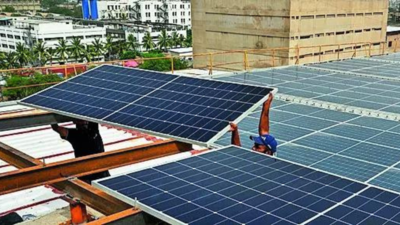ARTICLE AD BOX

NEW DELHI: In a big push for green energy, the Cabinet on Wednesday granted approval to state-run NTPC to invest up to Rs 20,000 crore in its green energy subsidiaries, a sharp rise from the earlier cap of Rs 7,500 crore.
It also allowed NLC India Ltd to invest Rs 7,000 crore in NLC India Renewables Ltd, its wholly owned subsidiary.I&B minister Ashwini Vaishnaw said work is in progress to increase NTPC's green energy capacity from 6GW at present to 26GW, with the target for 2032 being 60GW. Wednesday's decisions will "facilitate accelerated development of renewable projects in the country," he added.The relaxation in investment limit for NTPC will enable it to infuse capital into NTPC Green Energy Ltd, which, in turn, will support investments by NGEL in NTPC Renewable Energy and other JVs & subsidiaries for scaling up renewable energy capacity.On X, home minister Amit Shah said: "Increasing investment limits of NTPC & NGEL in the sector to Rs 20,000 crore will speed up our journey towards achieving the goal of producing 60GW green energy by 2032.... On the other hand, special exemption to NLC India Ltd will enable it to invest Rs 7,000 crore in green energy, standing out as our firm commitment to creating a greener Bharat and healthier planet."Vaishnaw said India has achieved a key milestone by ensuring that non-fossil fuel sources account for 50% of its installed electricity capacity, which was achieved five years ahead of its Nationally Determined Contributions target under Paris Agreement.
The target now is to increase non-fossil fuel generation capacity to 500 GW by 2030 and achieve net zero emissions by 2070.On the decision for NLCIL, the government said it would enable the government-owned entity to invest Rs 7,000 crore in NIRL and lead to NIRL investing in various projects directly or through formation of joint ventures, without the requirement of prior approval under the existing delegation of powers. The decision is expected to reinforce India's position as a green energy leader by reducing dependence on fossil fuels, lowering coal imports and enhancing reliability of 24x7 power supply across country.



.png)
.png)
.png)
















 4 hours ago
5
4 hours ago
5









 English (US) ·
English (US) ·